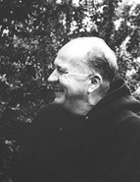Journey Into The Interior Poem by Theodore Roethke
Journey Into The Interior
In the long journey out of the self,
There are many detours, washed-out interrupted raw places
Where the shale slides dangerously
And the back wheels hang almost over the edge
At the sudden veering, the moment of turning.
Better to hug close, wary of rubble and falling stones.
The arroyo cracking the road, the wind-bitten buttes, the canyons,
Creeks swollen in midsummer from the flash-flood roaring into the narrow valley.
Reeds beaten flat by wind and rain,
Grey from the long winter, burnt at the base in late summer.
-- Or the path narrowing,
Winding upward toward the stream with its sharp stones,
The upland of alder and birchtrees,
Through the swamp alive with quicksand,
The way blocked at last by a fallen fir-tree,
The thickets darkening,
The ravines ugly.
There are a lot of well-worked-out images in this poem, touching on all the senses. It is visual and muscular and tactile and also very emotional for adroit choices and positioning. It is a visceral poem that goes to the gut, the gut we often refer to as basis to our instincts. And still I'm left feeling, in my head, my thoughts, that I don't fully comprehend the journey that's started in the first line. Out of the self. The movement out of the self is one the implies rejection and repudiation, an attempt to escape what is ultimately inescapable. We can change and evolve, seek therapy or anesthetize ourselves with intoxicants, but we remain ourselves, no one else. But Roethke already foresaw that contradiction in the title. He front-loaded the abstract, intellectual argument of the poem in the title and first line, then took us on a wild ride through the real world where we forget that heady stuff and deal with the real journey. It's a really risky stratagem of balance that, for me at least, gives the poem its ultimate impact. The need at the end to circle around and realize that journey, where ever it takes you, in or out, ultimately always leads back to the self.
It is obvious that you invest time and careful thought into both your reading and your commentary of works posted on this site. I would like to thank you and express that your insights are valued additions to this forum. All the best S
Frankly speaking, I did not understand the poem fully until I read some of the enlightening comments, particularly those of Lantz Pierre and Robert Murray Smith. Thanks to both.
Powerful poem! Theodore Roethke is one of my favorites. I especially love The Waking...
This poem has not been translated into any other language yet.
I would like to translate this poem
The long journey! Thanks for sharing this poem with us.